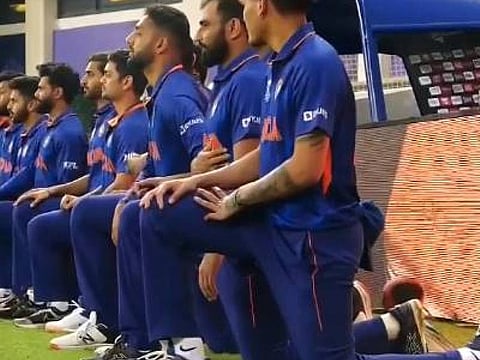T20 World Cup – To bend or not bend a knee: That is the question
Fairness of a cause does not justify or demand collective protests from our sportspeople

Politics, when it concerns how countries are or should be governed is not such a bad thing. Despite all its stratagems, snares, and seductions, we must consider it a necessary evil.
Politics in its wider connotation as the pursuit and maintenance of power actually pervades all spheres of human activity, from interpersonal relations between individuals and families, to outsmarting and outlasting your opponents in the national and international arenas.
Perhaps, that is why it is best to restrict it to a minimum if not keep it out of some especially sensitive areas of our lives. That is because politics does not necessarily mix well with them.
Rather, it causes divisions, rifts, and confusion. Or even worse. Riots, violence, killings. We know this all too well from history. Epoch after epoch has witnessed the disastrous impact of politics on these aspects of human endeavour and experience.
For instance, it is best to keep politics away from entertainment and culture. Else, the political risks overshadowing the aesthetic and the arts are reduced merely to handmaidens of power. Culture, too, has its own ends, not identical with those of politics.
Culture is meant to explore and express what is best in a particular people, region, or nation. But if politics interferes in it, the best is lost and, sometimes, even the worst comes to the fore.
Similarly, in sports, it is best to keep politics at bay even if we can’t escape it altogether. This somewhat lengthy preamble is meant to the address how we should react to a an issue that is drawing attention in sports lovers’ circles.
Should cricket teams during the T20 fixture at the UAE bend their knee at the beginning of matches in solidarity of the “Black Lives Matter” movement? Given the worldwide importance of this cause, right thinking people need to weigh in on the debate.
#BlackLivesMatter
First of all, let us be clear that the global movement in support of the “Black Lives Matter” campaign is well-worth supporting and endorsing.
People of African descent, reportedly one of the largest diasporic populations across the world, have faced discrimination for centuries. This is a fact that needs acknowledgement and rectification. They were enslaved not only by the West, but earlier, by others, including their own fellow-Africans.
Transported in the most inhuman conditions to distant parts of the world, they and their descendants were horribly exploited and oppressed for centuries.
Even after being emancipated, they did not enjoy equal rights in even the most advanced countries of the world, those countries, in fact, which champion human rights the most today. As we have seen in the last few months, they continue to face hardships and mistreatment at the hands of law-enforcement officers in some countries.
As we progress, we must all unite against these discriminations against our fellow humans, whether based on gender, colour, religion, ethnicity, language, region, class, caste, age, sexual preference, and so on. This needs concerted action and consciousness raising on our parts. No doubt entertainment and sports become an easy way to raise awareness and conscientise citizens across the globe.
But, having said this, for sports organisations and administrators to force teams to conform to or carry out such protests, no matter how strong or worthy the cause, is also unfair and coercive. Think about it. Once we allow it to start, where will it stop? Isn’t it like opening a Pandora’s box?
Caste discrimination and ethnic sledging
Next, we will expect them to bend their knee against caste discrimination or ethnic sledging of Northeastern Indians. Or, to shift the focus overseas, to the way people from the Indian subcontinent are treated in countries where they live and serve.
Or, to take an issue that concerns all of us, how about climate change? Should we ask our sports heroes to bend a knee before every game for climate justice? Or in support of refugees still awaiting asylum or rehabilitation in different parts of the world?
The point is simple: the fairness of a cause does not justify or demand collective protests from our sportspeople. The cause may be just, but the means, place, and context inappropriate. Regulatory bodies forcing blanket protests upon players is even worse.
It violates the sanctity of each player’s conscience. It is like saying that players should show gratitude to their chosen objects of worship not in accordance to individual beliefs but in conforming to one standard dogma or code imposed by their respective sports bodies.
Yes, individual players, within limits, may express their support for causes dear to them by wearing a badge or band or some other token, when allowed, within prescribed sizes, shapes, and areas of display. As also applies to commercial or brand endorsements.
They may also express such sentiments through appropriate gestures, provided these do not interfere with the game or infringe on the rights of other players. But to get everyone to bend a knee before a game, no matter how worthy the cause, is not “halal,” or should I say, “kosher”?
Knees may certainly be bent, as heads are bowed, in prayer, respect, even protest. But best to do this in temples, churches, mosques, or in private spaces. Sports arenas are not suited to such politics.
Let us keep these two important domains, , sports and politics, as far apart from each other as possible, at least when it comes to their visible or overt overlap.
That way, both sports and politics will remain true to their respective realms of responsibility, with minimum damage to one another, or, more importantly, to million of viewers, fans, and enthusiasts.







